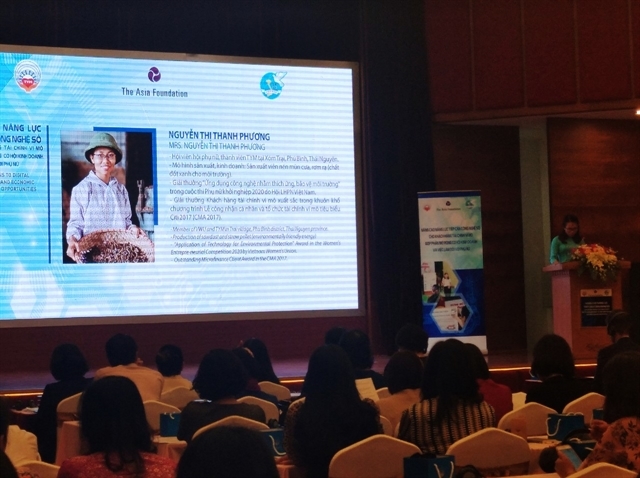The Go Digital ASEAN initiative focuses on closing the digital gap across ASEAN in support of the vision set out by the ASEAN Coordinating Committee on micro, small and medium enterprises (MSMEs).

Nguyen Thi Thanh Phuong, the owner of a sawdust block production workshop in Thai Nguyen Province, speaks about how digital training courses have helped improve her business.
Implemented by The Asia Foundation, with support from Google.org, Google’s philanthropic arm, the initiative will train 200,000 people from rural regions and underserved communities – including entrepreneurs, underemployed youth and women.
Working with local partners in Brunei, Cambodia, Indonesia, Laos, Malaysia, Myanmar, Philippines, Singapore, Thailand, and Vietnam, the US$3.3 million grant will broaden participation in the digital economy to include groups that have the most to gain from 21st century skills, such as digital literacy and online safety awareness.
The Vietnam component of the initiative was officially launched on Friday at a forum themed “Increasing access to digital education to expand economic and employment opportunities for women.”
Over 100 representatives from the Vietnam Women’s Union, Government agencies, the private sector, civil society groups, micro-finance service providers and women-led micro-enterprises participated in the forum.
In Vietnam, Go Digital ASEAN will focus on equipping women-led household businesses and micro-enterprises with critical technology skills to overcome the impacts of COVID-19 and leverage the digital economy for increased economic opportunities.
The project will train up to 65,000 individuals and help contribute to the country’s financial inclusion and socioeconomic development priorities.
The Vietnamese Government is prioritising the nation’s digital transformation to ensure inclusive development in the era of Industry 4.0. On June 3, the Prime Minister approved the National Digital Transformation Programme until 2025, with a vision toward 2030, with the aim of concurrently developing a digital Government, economy and society while also creating technology businesses capable of extending their reach to the world. In the process of digital transformation, large private enterprises are taking a leading role and leaving home-based micro-businesses behind.
The COVID-19 pandemic hit Vietnamese micro-enterprises hard, and women-led businesses were disproportionately affected. Many of the women who run household businesses faced barriers, such as inadequate skills and fluency in accessing online marketing tools, and were unable to move their business operations online to weather the crisis.
Nguyen Thi Thu Hien, a member of the presidium of the Vietnam Women's Union and general director of Tinh Thuong One-Member Limited Liability Microfinance Institution (TYM), said that providing digital literacy training for microfinance clients, micro and small enterprises was crucial.
Through the co-operation with The Asia Foundation, TYM has an opportunity to directly improve digital knowledge and skills for its clients and their family members, contributing to fostering business and employment opportunities.
It is also expected that female clients who are direct beneficiaries of this initiative will help equip other women and households with digital knowledge, thereby supporting more women to find business opportunities and generate employment.
Filip Graovac, the Asia Foundation's deputy country representative in Vietnam, said the Asia Foundation believed that digital platforms could help build resilience to human and natural disasters by supporting entrepreneurs living in hard-hit or remote areas to access money, supplies and markets outside of their immediate communities.
“Projects like Go Digital ASEAN expand digital literacy and grow the potential of microbusinesses, women and underserved populations so that they will not just survive, but thrive,” he said.
Tram Nguyen, country director for Google Vietnam, Laos and Cambodia, said that at Google, they knew technology played a significant role in helping many small businesses, especially during this time of crisis.
“For years, we’ve seen countless businesses around the world benefiting from the use of digital tools. Not only do they gain new skills, they now have the ability to reach new customers beyond their shores which ultimately helps to keep their businesses going,” she said.
“I believe it’s important for us to continue our work in this space and we are proud to support the Go Digital ASEAN initiative to help more Vietnamese businesses adjust and succeed as our economies reopen,” she said.
Nguyen Thi Thanh Phuong, 32, from the northern province of Thai Nguyen, said that TYM’s loans had helped her start a sawdust blocks production model.
In 2012 her workshop was only 100 sq.m, but now it had expanded to 1,000 sq.m, she said, adding that her business also provided regular jobs for 7-10 local workers.
Over the last few months, Phuong had been offered training about the internet, smartphones and online sales, she said, adding that new skills and understanding helped her locate information about materials, connect with business partners and consumers, and advertise her products.
Phuong said that thanks to the digital training classes, she had mastered online payments, including money transfers and bill payments.
“It’s so convenient for me,” she said, adding that she had also shown her friends and relatives what she had learnt.
VNS

Digital transformation vital for sustainable tourism growth
The COVID-19 pandemic has had a serious impact on Vietnam’s economy in general and its tourism sector in particular.